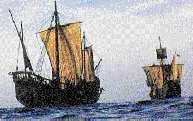from The Virginian Pilot
A small cache of emeralds and gold and silver coins was found in the sunken remains of an 18th-century Spanish galleon near Bimini this weekend, raising hopes among the salvors that the fabled and elusive Santiago El Grande has been found.
The treasure-laden ship - the very existence of which has been debated by scholars for years - is said to have sunk during a 1765 hurricane while carrying one of history's largest cargoes of gold and silver coins from South America through Havana to Spain.
- It all matches up, the carbon dating, the size of the ship, the maps from the archives,'- said Canadian treasure hunter Rick Meyer, who has led a five-year search for the ship. - There's no way to be sure yet, but we think we've found her. -
The first - cut in the coral - was discovered last fall, and searchers gradually came across wood planks and other debris.
Meyer, 36, who says he and investors have spent $3 million searching for the ship, said he became convinced he had a major find in January when he discovered enough of the ship to verify its size and confirmed the age of the ribs through carbon dating.
Many ships failed to complete the journey, however, falling victim to pirates, buccaneers and vicious storms. Their precious cargoes often ended up on the sea bed. The ships that went down included the Santissima Trinidad, an Altimiranta-class galleon armed with 60 cannon. It foundered in a hurricane in 1711, with the loss of $400m (£242m) in silver coins and other booty bound for King Philip V of Spain.
Skeptics abound...
"Sometimes these treasure hunters spend so much time looking for one ship, when they finally find something they convince themselves it's what they've been looking for," said Pat Clyne, spokesman for successful treasure hunter Mel Fisher, who has recovered $400 million since 1985 from the Nuestra Senora de Atocha near Key West.
Mark Wilson, the Bahamian government official in charge of authenticating such finds, said a representative from his office had viewed the treasure and that Bahamian defense forces had been alerted to guard the wreck. The Bahamas, which issued a permit to Meyer to explore the site, will get 25 percent of any find.
"All I have is a verbal report right now," Wilson said. "But I have an agent there and she in fact has seen some of the coins and gems. My inclination right now is to believe we have a significant find."
"In the high-finance world of treasure hunting, the shortage of investors makes it worthwhile to perpetuate myths, said Eugene Lyons, a renowned Spanish colonial historian from St. Petersburg. But Meyer said Thursday that the operation is closed to investors. "I have plenty of money," he said.
Last Friday, while diving in less than 100 feet of water, which Meyer says means salvors can work without heavy gear and with natural light, he vacuumed a marble-sized emerald from the sand. In the next few hours, Meyer gathered 37 emeralds, ranging from tiny to about 20 carats, with a total weight of about 200 carats. He also found gold and silver coins, he said.
"Things were getting better, too, but we were stopped cold by the weather."
The gems were found slowly at first, but then one after another, making Meyer think he was getting closer to the main treasure before rough seas forced him to bring his 45-foot cabin cruiser and eight-man crew back to South Florida. Meyer says he will now organize "a massive salvage operation."
Although the emeralds, now in a vault in Nassau, have not been appraised, they could be worth as much as $9,500 per carat, depending on where they were mined and their quality, according to Corey Malcom, director of archaeology at Mel Fisher's Maritime Heritage Society. Meyer believes the emeralds were mined in Colombia.
Finding Raises Hopes of Treasure Hunters
From the New York Times
A cache of emeralds, gold and silver found off Bimini in the Bahamas has raised the hopes of treasure hunters that they have finally located a Spanish galleon said to have sunk with a huge cargo of gold and silver coins more than 200 years ago.

/div>
 /div>
/div>

